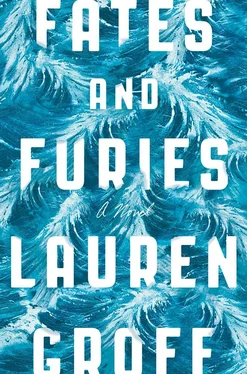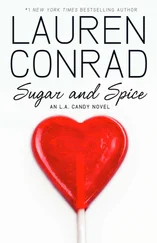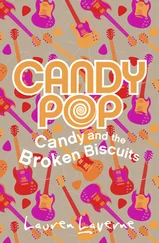“Since when does it snow on Halloween? Global warming, schmobal schwarming,” Luanne said, stomping her boots on the rattan mat. She was Mathilde’s friend from the gallery where they worked and was painted up cleverly as Picasso’s Dora Maar, the one with the bitten apple for a cheek. She kissed Lotto lingeringly, saying, “Oh, hail yes, Caesar.” He laughed too loudly, pulling away. Luanne was trouble. Mathilde came home most days with stories about how she tried to seduce their boss, some gross bulgy-eyed man with vaudeville eyebrows named Ariel. “Why?” said Lotto. “She’s pretty. She’s young. She could do way better.” And Mathilde shot him a look, and said, “Babe. He’s rich ,” and, of course, that explained it. Together Lotto and Luanne went toward Mathilde, who was resplendent in full Cleopatra, eating a cupcake beside the huge brass Buddha on the mantel adorned with sunglasses and lei. Lotto dipped his wife and licked the crumbs from her lips as she laughed.
“Yuck,” Luanne said. “You guys can’t be freaking real.” She went to the kitchen, took a Zima from the fridge, moodily sipped, made a face. She’d gauged the low state of Lotto’s mind by the size of his belly and how crowded the apartment was with used books; in his low moments, reading was all Lotto could do. Funny, because he seemed like such a huge goofball, and then he opened his mouth and quoted paragraphs of Wittgenstein or something. It unnerved her, the gap between who he appeared to be and the person he held inside him.
Someone put on a Nirvana CD and girls got up from the leather couch Lotto had rescued from the sidewalk. They attempted to dance but gave up, put Thriller on again.
Chollie, green goblin, sidled up to Lotto and Mathilde, slurringly drunk. “I never noticed how close-set your eyes are, Mathilde, and how wide yours are, Lotto.” He made a stabbing motion with two fingers at Mathilde and said, “Predator,” then stabbed at Lotto and said, “Prey.”
“I’m the prey and Mathilde’s the predator?” Lotto said. “Please. I’m her predator. Her sexual predator,” he said, and everyone groaned.
Luanne was gazing at Arnie across the room. She made an impatient motion with her hand. “Shut up, you guys,” she said. “I’m ogling.”
Mathilde sighed, backed away.
“Wait. Who? Oh, Arnie,” Chollie said, spiteful. Disappointed? “Please. He’s so stupid.”
“Dumb as a dead bulb,” Luanne said. “Exactly my point.”
“Arnie?” said Lotto. “Arnie was a neuroscience major in college. He’s no dumbo. Just because he didn’t go to Harvard like you doesn’t make him dumb.”
“I don’t know. Maybe he’s pickled his brains with booze,” Luanne said. “At your last party I overheard him say that Sting is his spirit animal.”
Lotto gave a whistle across the room; Arnie-as-the-Hulk looked up from the sea of girls for whom he was making chocolate martinis. He made his way over to Lotto, clapping him on the shoulder. Chollie and Arnie were both painted green. Side by side, Arnie was the pneumatic before and Chollie the punctured after.
Lotto told Arnie, “Luanne said she’d jump your bones if you can define ‘hermeneutics’ in a satisfactory manner,” and he steered the two into the bedroom, closed the door.
“God,” Chollie said. “I’d die.”
“They haven’t come out of the room yet,” said Lotto. “Some Cupid kills with arrows, some with traps.”
“Shakespeare again?” Chollie said.
“Forever,” Lotto said.
Chollie stalked away. Lotto was alone. When he looked up, he saw only himself reflected in the night-blackened windows, the belly that had developed during his blue summer this year, the shine at the temples where his hair was going. Three and a half years out of college, and Mathilde was still paying the bills. Lotto rubbed the Buddha’s head sadly and walked past a covey of witches huddled over someone’s Polaroid paper, faces summoned out of the murk.
Mathilde’s back was turned, and she was speaking low to Susannah. Lotto crept forward and knew she was talking about him. “—better. Coffee commercial in September. Father and toddler out on a fishing boat at dawn. Apparently the kid fell in and Lotto fished him out with an oar and saved his life. Our hero!”
They laughed together, and Susannah said, “I know! Folgers. I’ve seen it. Dawn, a cabin in the woods, the kid waking up on a rowboat. He’s so striking, Lotto. Especially with a beard.”
“Tell all the directors you know, get him a job,” Mathilde said, and Susannah said, “For what?” and Mathilde said, “Anything at all,” and Susannah gave a half-mouthed smile and said, “I’ll see what I can do.”
Lotto, stung, hurried away without letting them see him.
Mathilde was never unkind, but she wore her passive aggression like a second skin. If she didn’t like her food at a restaurant, she wouldn’t touch it, keeping her eyes low and saying nothing until Lotto was forced to tell the waiter the food was too salty or undercooked and could they please have something else, thanks so much, buddy. She once maneuvered an invitation to a wedding in Martha’s Vineyard by standing next to the bride all night, a big-time Broadway actress, smiling gently but not speaking a word until the bride impulsively asked them to come. They attended, danced; he charmed a producer and got a callback for a revival of My Fair Lady , though his voice was not great, and he didn’t get the role; they sent the actress a very nice set of antique silver grapefruit spoons they’d bought in a thrift store and polished to appear expensive.
Up before Lotto rose a vision of himself as if attached to a hundred shining strings by his fingers, eyelids, toes, the muscles of his mouth. All the strings led to Mathilde’s pointer finger, and she moved it with the subtlest of twitches and made him dance.
The Chollie goblin came to a stop next to Mathilde, and together they watched Lotto across the room in a ring of boys: a bottle of bourbon hung between the hook of two fingers, the gold circlet of leaves flapped off the back of his head.
“What’s eating your ass?” Chollie said. “You seem off.”
Mathilde sighed, said, “There’s something wrong with him.”
“I think he’s fine,” Chollie said. “We only have to worry if he’s way up or way down. He’s coming out of the dip from the summer.” He paused, watched Lotto. “At least he’s losing his potbelly.”
“Thank god,” she said. “All summer I thought he was about to jump in front of a train. He needs to get a role. Some days he never leaves the apartment.” She shook herself resolutely. “Anyway. How’s the used-car business?”
“Quit,” Chollie said. “I’m in real estate now. In fifteen years, I’ll own half of Manhattan.”
“Right,” Mathilde said. Then, suddenly, “I’m leaving the gallery.” They both looked startled.
“Okay,” Chollie said. “Who’ll support the genius?”
“I’ll work. I got a job in some Internet start-up. A dating site. Begin in a week. I haven’t told anyone yet, not Luanne or Ariel or Lotto. It’s just. I needed a change. I thought my future would be in art. It’s not.”
“Is it in the Internet?”
“All of our futures,” she said, “exist in the Internet.” They smiled together into their drinks.
“Why are you telling me?” said Chollie, after some time. “I mean, I’m a weird choice of a confidant. You know?”
“Don’t know,” Mathilde said. “I can’t tell if you’re benign or malignant. But I feel like I could tell you all my secrets right now and you’d keep them to yourself, waiting for when best to deploy them.”
Chollie went very still, watchful. “Tell me all your secrets,” he said.
Читать дальше












